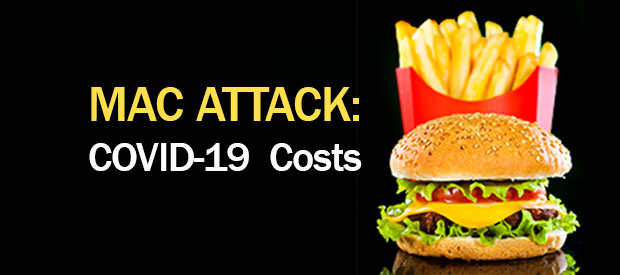Franchise 101: Successor Franchisor’s Territorial Takeover; and McDonald’s Cooks Up COVID-19 Insurance Coverage

Franchisor 101: Successor Franchisor’s Territorial Takeover
A federal court in Connecticut ruled against an urgent care franchisor’s motion to dismiss, finding the plaintiff had standing to sue under Article III of the U.S. Constitution. The court still dismissed the plaintiff’s claims under the Connecticut Franchise Act (“CFA”) and the Sherman Act.
AFC Franchising (“AFC”), the successor-in-interest to Doctors Express Franchising, entered into a Master Development Agreement (“MDA”). The MDA granted the master developer exclusive rights to develop, open and operate franchises, assist with franchise sales, and provide franchisee support in several counties in New York and Connecticut. The master developer sued for damages and sought an injunction when AFC contracted to buy four franchisees in its Connecticut territory and turn them into corporate urgent care centers. The master developer alleged this violated its MDA. Previously, the court held the master developer could bring the claims in Connecticut despite the MDA having a forum selection clause in Alabama. The court ruled AFC was an unknown assignee of the prior franchisor and AFC’s enforcement of the forum selection clause was not foreseeable to the master developer.
AFC argued that the master developer lacked Article III standing because the alleged damages were too speculative. The court disagreed because AFC entered into contracts with franchisees in the master developer’s territory. If those franchisees turned into corporate units, the master developer would lose profits from the franchisees’ royalty payments in its territory. The master developer’s protected interests were particularized and actual, not conjectural or hypothetical.
The court ruled against the master developer’s CFA claim, because a master developer has a different business than a franchisee. The master developer agreed to find prospective franchisees for the franchise system and manage those franchisees. In contrast, by definition under the CFA, a franchisee is licensed the right to offer, sell or distribute goods or services from a franchisor. This master developer did not have a right to sell a franchisor’s goods or services under the MDA.
Finally, the court held the master developer’s claims under the Sherman Act were conclusory and inadequate and lacked antitrust standing. The master developer alleged AFC’s acquisitions in its market were an illegal restraint of trade or commerce to monopolize its territory. But the master developer did not define the urgent care market and the court found the contract dispute did not raise anti-trust concerns.
Franchisors, especially successor franchisors of another franchise system, must be aware of and discuss with franchise counsel provisions in the franchise agreements, master developer agreements and other agreements of the system it intends to, or does acquire. Agreements that the franchisor inherits can prevent encroachment on territories of master developers and franchisees. If disputes arise, enforceability of forum selection and choice of law provisions can be subject to challenge by virtue of being agreed to by a predecessor.
Danilo Purugganan, Plaintiff v. AFC Franchising, LLC, Defendant, U.S. District Court, D. Connecticut, ¶16,824, (Feb. 24, 2021)

Franchisee 101: McDonald’s Cooks Up COVID-19 Insurance Coverage
An insurance coverage case brought by McDonald’s and two of its franchisees (collectively, “McDonald’s”), raised a novel question in Illinois state court. The question was whether or not costs to comply with a mandatory injunction related to the COVID-19 pandemic are bodily injury damages triggering the insurance company’s duty to defend claims.
In the underling lawsuit employees claimed public nuisance and negligence for McDonald’s keeping its restaurants open during the pandemic without sufficient new health and safety practices. McDonald’s policy was that employees and managers could take off their masks and stand within six feet of each other but not in excess of 10 minutes. McDonald’s face covering and distancing policy conflicted with the Illinois governor’s executive order and CDC guidance. Some McDonald’s restaurants did not successfully enforce the policy, which resulted in employees wearing their masks below their nose and mouth or not at all, due to the “10-minute” rule.
Plaintiff employees sought an injunction requiring McDonald’s to provide adequate personal protective equipment, preclude reuse of face masks, supply hand sanitizer, require customers to wear face masks, monitor employee COVID-19 infections, and provide employees with accurate information about COVID-19. In June 2020, the court granted a partial preliminary injunction that required McDonald’s to train employees on social distancing and to enforce mask wearing policies.
McDonald’s claimed its general liability insurance policies covered increased compliance costs as damages due to bodily injury. The insurance company argued that McDonald’s claims did not equate to damages “because of” bodily injury. The court disagreed. The mandatory injunction plaintiffs sought would cause McDonald’s to spend money to prevent continuous exposure to the COVID-19 virus and McDonald’s would not have to pay such damages “but for” or “because of” employees contracting the virus which caused bodily injury. Under Illinois law, “exposure to potentially harmful contaminants” can be bodily injury “even without manifestations of sickness or disease.” The insurance company therefore had a duty to defend McDonald’s in the underlying case.
Government mandated closures and restrictions imposed on franchisors and franchisees to combat the pandemic led to economic losses to many businesses. That led to insurance claims on business interruption and other policies. In most cases, losses due to the pandemic were denied as policy exclusions. Franchisors and franchisees should be aware of the implications of this case, which may provide a roadmap to obtain insurance coverage for certain types of pandemic related expenses.
McDonald’s Corporation, McDonald’s USA, LLC, Lexi Management, LLC, and DAK4 LLC, Plaintiffs v. Austin Mutual Insurance Company, Defendant., U.S. District Court, N.D. Illinois, ¶16,820, (Feb. 22, 2021)